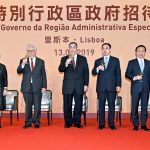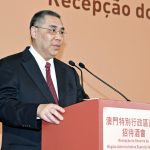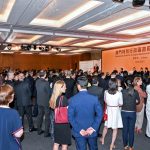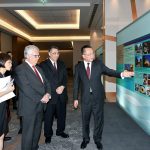 The Chief Executive, Mr Chui Sai On, and the Minister of Internal Administration of the Portuguese Republic, Mr Eduardo Cabrita, attend a reception hosted in Lisbon, Portugal by the Government of the Macao Special Administrative Region.
The Chief Executive, Mr Chui Sai On, and the Minister of Internal Administration of the Portuguese Republic, Mr Eduardo Cabrita, attend a reception hosted in Lisbon, Portugal by the Government of the Macao Special Administrative Region.
Macao and Portugal are to work more closely together in order to seize opportunities arising from the “Belt and Road” initiative. Such effort will boost the sides’ confidence that reciprocal benefits from Macao-Portugal cooperation could be even brighter than before.
The Chief Executive, Mr Chui Sai On, delivered a speech on Monday evening (13 May) in Lisbon, Portugal during a reception hosted by the Government of the Macao Special Administrative Region (SAR). Mr Chui is on a nine-day visit to the country.
Prior to the reception, Mr Chui, along with the Minister of Internal Administration of the Portuguese Republic, Mr Eduardo Cabrita, and the Ambassador of the People’s Republic of China to the Portuguese Republic, Mr Cai Run, viewed an exhibition of photographs. It was presented by the SAR Government.
Mr Chui stated the photographic exhibition showcased not only the successful implementation in Macao of the “One country, two systems” principle, but also Macao’s close ties with Portugal.
In his address delivered at the reception, Mr Chui mentioned China and Portugal were good friends and partners, noting that the comprehensive strategic partnership between the two countries had been moving to a new, higher level.
The “Belt and Road” initiative, proposed by China, had gained wide international attention, and had received strong support from Portugal. Friendly and cooperative relations between China and Portugal also created new impetus for Macao-Portugal ties, said Mr Chui.
The Chief Executive stressed the SAR Government dedicated great effort to propelling Macao-Portugal cooperation.
During his speech, Mr Chui reviewed bilateral exchanges and ties over the past years, including fruitful outcomes under the Macao-Portugal Joint Committee mechanism.
Mr Chui spoke of frequent people-to-people exchanges and a profound historical connection between the two sides. Street-name signs in Macao were written in Chinese and Portuguese, and a number of buildings in the Historic Centre of Macao had Portuguese architectural influence. The Chief Executive said these were two among many examples of the ties between Macao and Portugal.
Macanese and Portuguese living in Macao, and Portuguese business people, were among those committed to contributing to the development of Macao, he added.
Mr Cabrita also delivered a speech at Monday’s reception. He said that Macao and Portugal enjoyed a long history of friendly exchanges, adding that Macao played an important role in the growing framework of China-Portugal relations.
The Minister noted the Macao SAR had made a success of its development. He added he believed the friendly relations between Macao and Portugal would be maintained and further advanced. Vivid evidence of the close Macao-Portugal ties was the large community of Portuguese living in Macao, the presence of the Macao Portuguese School, and the existence of Portuguese-language media.
Approximately 230 people attended Monday’s reception, including members of the SAR Government delegation; officials of the Portuguese Government; representatives of Portugal’s Assembly of the Republic; representatives of judicial bodies; representatives of Lisbon City Hall; representatives of educational institutions; and people from media organisations.
Guests at the reception also included: officials from the Embassy of the People's Republic of China in Portugal; representatives of embassies in Portugal from among other accredited countries; people from Chinese companies in Portugal; representatives of overseas Chinese associations in the country; and officials that had served in Macao during the period of Portuguese administration; as well as other people that had connections with Macao.





